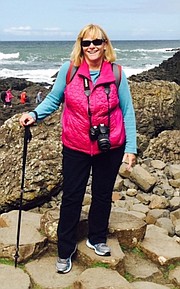“There is nothing like a smile or a hug from my CASA children,” said volunteer Terrie Smith. “I love when my children tell me, ‘I missed you.’ The children have developed a trusting relationship with me and I have been a constant in their lives when others are not able to be.”
Terrie Smith has been a Court Appointed Special Advocate (CASA) volunteer for the past 15 years. She first learned about CASA from another community member with the same weekly appointment time at her local nail salon many years ago. Week after week, she gained more information from the volunteer about her experiences. Having two young children and a full-time teaching job at the time, Smith decided that she didn’t have time to volunteer as a CASA, but promised herself that when she retired she would look into volunteering at CASA.
When she retired in 2001, she submitted her application and signed up to participate in the 30-hour training program. “I was accepted into the training class for September, 2001. However, I wasn’t fully committed and as I left the training each night, I wasn’t sure that I’d return the next session. However, the tragic events of Sept. 11, 2001 occurred the week I was training and rocked my world like everyone. I decided that I should do something to make my part of the world a better place and have been a CASA ever since,” she said.
After the pre-training, she was appointed to her first case. She was assigned to a brother and sister who were both in elementary school at the time and continued her relationship as an advocate with the little girl for four years and with the little boy for six years. She has been assigned many other cases and cannot believe that she has already been with CASA for 15 years.
CASA provides court-appointed volunteer advocates so every abused or neglected child in the United States can be safe, have a permanent home and the opportunity to thrive. CASA volunteers get to know the child by talking with everyone in that child's life: parents and relatives, foster parents, teachers, medical professionals, attorneys, social workers and others. They use the information they gather to inform judges and others of what the child needs and what will be the best permanent home for them.
Smith says that the amount of time spent volunteering is dependent on the situation that the child is in. Once she has her assignment, she will read the youth’s court file, talk with his or her social worker and then meet the child at school.
“That’s where my education background is so helpful,” she said. “I bring board games and art materials. During our activity, I talk with the kids and feel them out as to what is going on in their lives. I can also advocate for services related to school — for testing, getting additional staff resources, finding tutors, etc.”
She is required to attend 12 hours of in-service each year and with each case, she is responsible for talking with all the adults in her child’s life and then submitting a report every six months. “It’s a big responsibility,” she said. “I try to check in with everyone separately to get input from everyone to present an objective fact-based report to the court. It often takes me 10-15 hours to write my report because I know my findings will influence the judge. It’s a big responsibility, but I love knowing I am truly helping a child. CASA is an amazing program because of what it does for the children. You know that you are helping the kids by advocating for what they need.”
To become a CASA volunteer, visit www.casaforchildren.org. They are looking for people who care about children and who have good sense. They must be 21 years old, complete a minimum of 30 hours of pre-service training, background checks and interviews, be willing to commit until the first case is closed, and be available for court appearances with advance notice.
